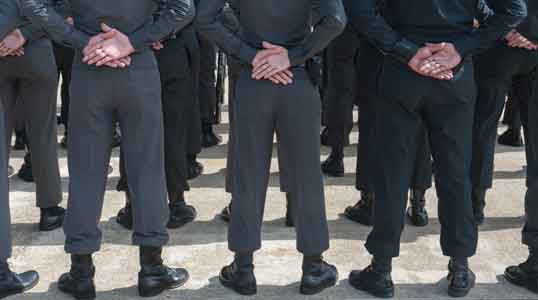The article below originally appeared on Police One website in February of this year. I think it gives us a lot to think about. There are certainly ways we can train wrong. Let’s all make sure we don’t fall into the mistakes made the article points out.
The Deadly Dangers of De-training
By Mark Smith
The negative trainers — such as routine or foolish peers — are relentless in their training and it can only be countered by good training and coaching.
Who’s training you?
One of the big issues I have argued about over the years is what is — and what isn’t — training. I have had many “experts” say video training isn’t training, or a class on mindset isn’t training. We don’t do any repetitions, we don’t practice, so it isn’t training, they argue.
These folks are confusing the verb “training” with the noun “training.”
Training (the noun) is defined as the long-term modification of behavior. If I have you do hundreds of repetitions and hours of training (the verb) in the academy, we can say you have learned this skill or that tactic, but is it training in the long run? If the first high-level operator you work with says to you “standing to the side of a door when knocking isn’t macho” or “wearing a seatbelt isn’t tactical,” and it changes the way you stand at a door or drive a vehicle, all of the repetitions are for naught, and the fool has been the more effective trainer with a single sentence!
Observational Learning
It is easy to diagnose what this officer did wrong or that deputy should have done to survive, but often what they did reflects the effects of the many things that change our behaviors, train us, or in some ways detrain us.
Routine is perhaps the deadliest of these “detrainers” in our lives.
Familiarity truly does breed contempt for the various risks and threats we face, and every time we get away with turning our gun side to a subject, or do poor or no searches on our arrestees, it is a powerful repetition that if not corrected by some feedback such as a good fight for your life, will become a habit, which means the bad behaviors will be repeated by you every time!
Once an officer is detrained by routine, others will observe their new bad habits and learn from that. Observational learning is a powerful and insidious enemy of good tactics. Humans watch and learn and our brains don’t discern good from bad very often, they just learn and change.
How many times have you seen an officer handcuffing a suspect in a lackadaisical manner with a bad technique and wonder how they learned it.
The Informal Leader
The next deadly trainer in law enforcement is the informal leader who either is detrained, macho, or foolish. The wall has many names of officers who fell because with a simple sentence or mocking phrase, the informal leader is able destroy weeks or months of training.
I remember as a young officer being mocked for wearing body armor back in 1975 by a large strapping veteran who said it would make us reckless and he could deal with a .357 without one. He implied anyone who wore one was a wimp!
I just replied every time I put on my vest that someone, somewhere wants to test my vest and I would be ready.
I know many of you expect me to tell you he was shot a year later or some such thing but it seems luck sometimes favors the stupid and the fellow had a long career marked by foolish tactics and actions that endangered other officer, but his words never improved and I often wondered how many youngsters were detrained by his influence.
The challenge is to ask yourself who has truly trained you? Do you still do the good tactics you trained to do or did some other influence change your behavior, your tactics, your habits, for the worse? If you replay your last traffic stop in your mind, do you see yourself doing anything foolish?
Not Today
Finally, I want to challenge all you supervisors to think about the various influences on your people and your role in being the antidote for the negative training that occurs. Sergeants are the natural extension of verb “training” throughout one officer’s career.
Feedback modifies behavior and the closer to the repetition, the more effective the feedback. If one of your deputies keeps turning his back on violators, challenge that behavior, go to BLUtube and review a video of an officer getting in a confrontation because of that behavior.
Correct it, challenge it, don’t enable it.
Remember, the negative trainers — such as routine or foolish peers — are relentless in their training and it can only be countered by good training and coaching. A good supervisor sees their role as coaching for excellence and survival.
We keep safe by maintaining our good tactics and skills and it seems so often the world conspires to erode them so we have to decide to actively resist. Risk is everywhere, so remember, on every traffic stop, on every building search, on every arrest, think, “Not Today!”

